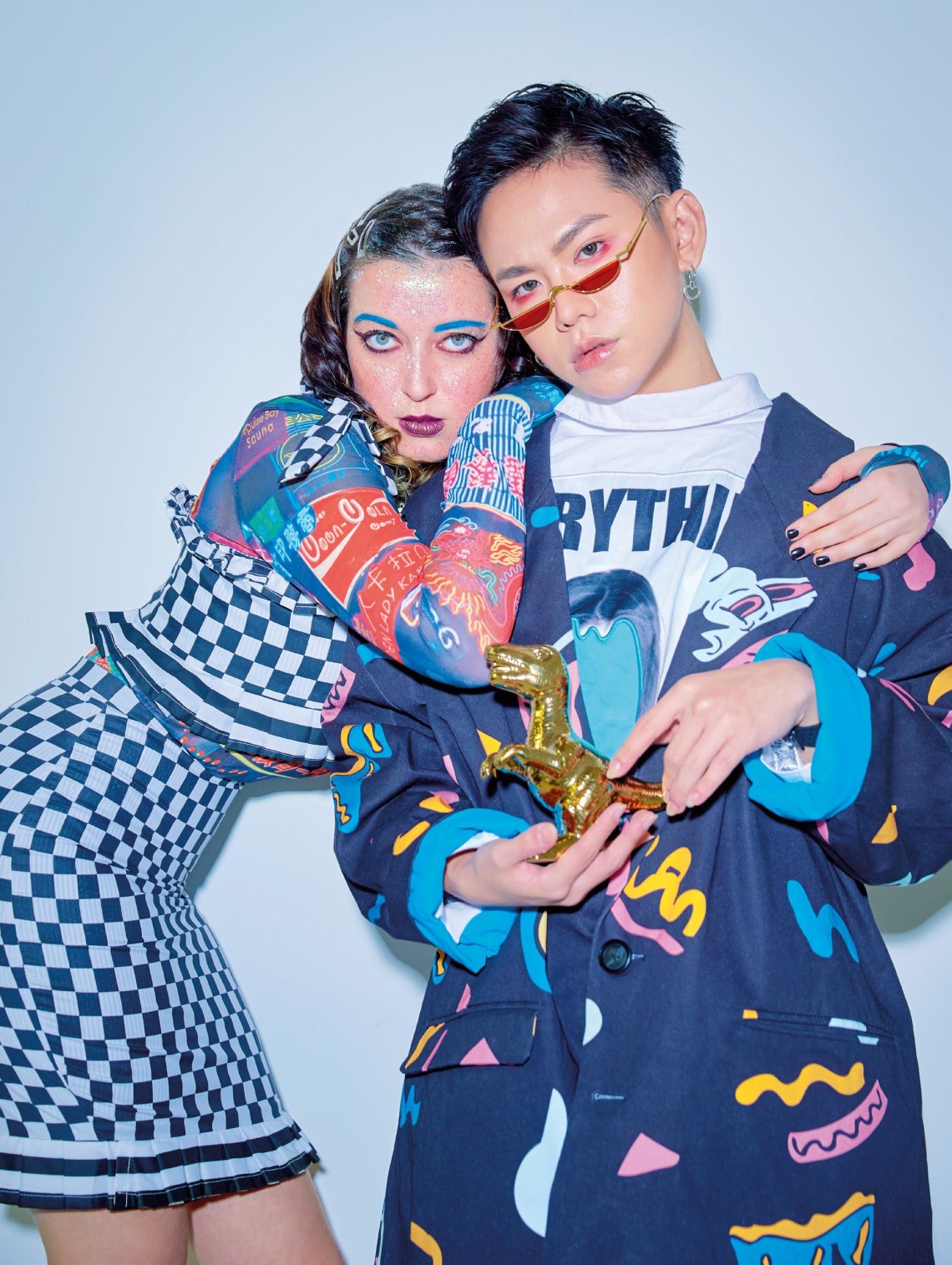Underground, misfit, weird, and 100 per cent wonderful that way. Way before such attributes became Gen Z buzzwords, the DJ/boutique owner/nightlife impresario was steadily living and dressing up by them.


Fresh off the launch of his art book Freakdom, he gathers some of his pals to talk alternative style, youth culture and what it truly means to be an individual. By Keng Yang Shuen.
“There has never been a club kid culture in Singapore.” This coming from Bobby Luo might seem a tad surprising. Besides being a DJ, independent party organiser and owner of cult multi-label boutique Super Freak, the 48-year-old is best known for co-founding the madcap, now-defunct 2000s nightclub, The Butter Factory, and the colourfully outrageous outfits he tends to wear on nights out.
It’s led to him being tagged – probably too often – a club kid, a reference to the counterculture tribe of experimental, fashion-obsessed youths who ruled New York’s underground party scene in the ’80s. After all, it’s easy to foist uncalled-for labels onto others and let appearances dictate impressions. The soft-spoken Luo, however, would like this clarified.
“When we started (The Butter Factory), we adopted some of the key Club Kid sensibilities such as freedom of expression, the embrace of diverse identities and (the curiosity of) exploring characters,” he says. “(Strictly speaking though), there isn’t really such a scene here. If anything, we’re too busy being individuals!”
Club Kid or not, individualistic sums up the baby-faced man’s aesthetic and MO to life. For this year’s Pink Dot gathering, for example, his outfit included a top fashioned out of a gaggle of Pink Panther stuffed toys that recalls what Lady Gaga would wear in her early years. But while even the said Lady has toned down and slicked up her image these days, Luo continues to do his thing.
His current project: the reinvention of his five-year-old boutique at Orchardgateway. Originally named Superspace and solely carrying fashion labels like Bernhard Willhelm and Tata Christiane, it now also boasts areas for art, music, gifts, and a thrift marketplace with everything emblematic of independent culture – think statement costumes designed in collaboration with local creatives.
“After five years, I want to give the shop a last shot, and it’s only fitting that I continue to explore this narrative of statement dressing; of celebrating misfit/freak culture and being your most authentic self – even if it means being extra AF,” says Luo.
Also in development: a website to accompany Freakdom, his art book that chronicles a year’s worth of his outfits, launched at Dover Street Market Singapore in May. A work-in-progress, it’s meant to be a “style bible” for the like-minded around the world, he says.
“As soon as you stop trying to blend in and be like everyone else, you can follow your own passion and make the experience that you want. I’m ready to slay the next chapter of my life and continue to break genres and stereotypes; to innovate and create something new.”
Helping to keep him inspired is his coterie of creative allies that’s grown to include some of Singapore’s boldest young artistic talents, including the Gen Z artists Howie Kim and Polina Korobova. “I love them. They bring so much energy and vibrancy and life to the table,” he says.

Freakdom author and OG party monster Bobby Luo (opposite, far left) counts among his close coterie of creative pals – and inspirations – Gen Z artists Polina Korobova (this page, left and opposite, middle) and Howie Kim. Besides being an early supporter of their work, he’s roped them in to help with makeup and designing graphics for his events respectively.


Luo (left) with drag queen supreme Eugene Tan (aka Becca D’Bus) – together with Prashant Somosundram, they help organise The Glory Hoes, a film series at The Projector that takes place every last Friday of the month, and liven up the queer cinema experience with costumes, audience participation and an after-party.
“It’s really very exciting to see youths breaking new moulds and challenging stereotypes... As they hone their own individualism, their weirdness will become their greatest asset.” Here, Luo and his “freak clique” – young and OG – discuss creativity, fashion and true individuality in Singapore today.
ON HOW BEING A “FREAK” IS NOW PERCEIVED TO BE COOL
Bobby Luo (BL): “In this day and age, we should be a diverse and inclusive society, so I think we need to embrace everyone: flaws and all, freak or otherwise, whatever gender or expression of self, and no matter what inclination one leans towards.”
Eugene Tan (ET): “I think the idea of being a freak is more urgent than ever. We’ll always find ways to wrap what’s considered different into popular culture. Look at drag – because of shows like Drag Race, there’s this idea that it’s more mainstream than ever, but there’s actually a lot to it that’s not, and has very interesting, if difficult, things to express (and will probably never be popularly embraced). It is all the more important to celebrate and find ways to include these (neglected) aspects, and not sandpaper them away.”
Nathanael Ng (NN): “I feel like in Singapore, people are still trying to get used to (this philosophy), and that it’s a bit better overseas.”
Howie Kim (HK): “People like Bobby do help push for (the embrace of) ‘freakdom’, and I think that the scene here is changing. People are (more comfortable) being themselves these days.”
Polina Korobova (PK): “Yeah, when I first went to one of his parties, I was like, ‘Where were all of these cool people before?’ I never knew about all these creatives. Bobby’s like the godfather of freaks, and (he helps to) bring them together.”
Aaron Han (AH): “Growing up in the ’90s and early 2000s, being different was (something that brought) shame. At least now, there’s conversation about how one can be different and still contribute to society, or be a good person... I’m happy (that the younger generation) don’t have to hide themselves.”
ON THE EVOLUTION OF SINGAPORE’S CREATIVE SCENE
NN: “There are definitely more opportunities now.”
AH: “Yeah, but also more problems because we are not constantly exposed to creativity. Having said that, restrictions force (people to be) creative. The scene is definitely improving. We’re not there yet, but we’re getting there.”
BL: “The creative scene now is cool. The next generation is doing really crazy stuff, and I’m really excited for them. I’m always on the lookout for people who are up-and-coming and do what they want to do... without any limitations or worries about society’s expectations. Just break all the rules and see what comes out of it.”
ET: “I think there are a lot of creative people here doing interesting things, but as with any capitalist society, society will (find ways to) make money off them, and that is often antithetical to what these creatives are actually interested in.”
PK: “Hopefully the scene gets better. Already, a lot of our friends and classmates are doing very well in the various arts, and genres like performance or painting... I think people are becoming braver and not caring that much (about what others think.)”
ON WHAT SHOULD BE BROUGHT BACK FROM THE DAYS OF THE BUTTER FACTORY
NN: “The community, because a lot of those in it have grown up, and are married and have kids.”
AH: “I would bring back the raw, creative energy that was always there. People will change, but that feeling...”
NN: “The feeling of being home.”
AH: “Yeah, it was home. Where else could one be so crazy or different and still be accepted?”
NN: “Now I feel like people are doing a lot of pop-up parties, so there isn’t one constant (place to go to) – one that I know would be there, and where I know I would be able to find my (type of) people if I decided to go, like, tomorrow.”
BL: “This is impossible, but I would bring back the innocence of those days when people did not know what to expect and would change up (the status quo) a bit just to see what would happen next. A lot of times now, everyone’s really afraid to say this or do that, and no one’s being in the moment or spontaneous. Everything’s on social media, so that kind of spontaneity (which used to be what made nightlife and popular culture great) has been lost. So yeah, I’d like to bring back that innocence and spontaneity, but I don’t think that’s possible.”

Among Luo’s (middle) wildest fashion allies are designer Nathanael Ng (left), who also helps co-organise (with Luo) the alternative hip-hop party Baby Boy, as well as handle social media and visual merchandising at Super Freak; and visual artist Aaron Han, who was part of the original team behind Luo’s now-defunct club The Butter Factory.

The name whom Luo (right) is probably most synonymous with: Ritz Lim, creative director of Ritz Salon and his long-time partner in life, business (they co-founded The Butter Factory and Super Freak) and outrageous dressing.
PHOTOGRAPHY VEE CHIN ART DIRECTION JONATHAN CHIA HAIR MIHO KIMURA/ITTO + LIM MAKEUP BENO LIM, USING MILANI COSMETICS























